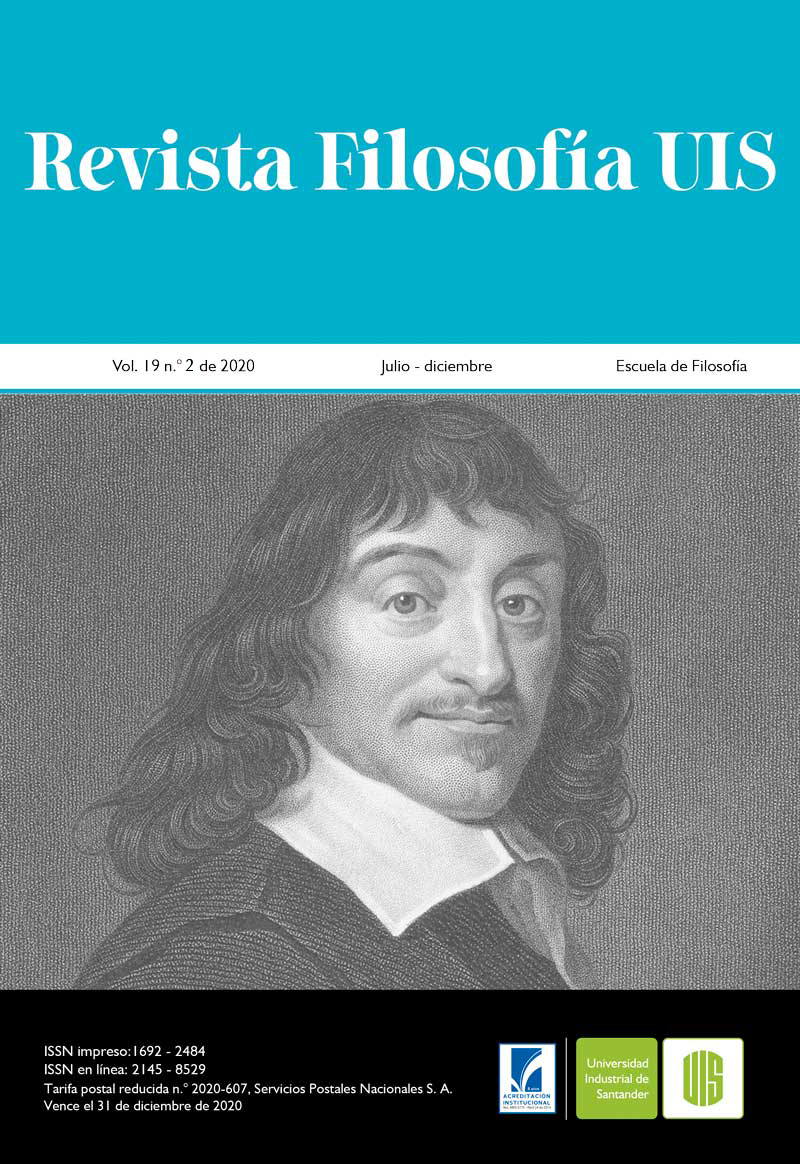Mimetic desire and liberation in the victim’s intelligence
Published 2020-05-29
Keywords
- violence,
- victim,
- desire of appropriation,
- liberation,
- mimetic phenomenology
How to Cite
Copyright (c) 2020 Revista Filosofía UIS

This work is licensed under a Creative Commons Attribution 4.0 International License.
Abstract
One of the intentions proposed by this work is to generate a philosophical reflection on the social definition of the victim. The hypothesis of this investigation is a hermeneutic approach on the ways that the philosophy of law has to reach the epistemic condition of the victim. By epistemic condition we understand the criteria of the possibility in which we can name the singularities of a social phenomenon, inevitably shown in the consciousness in an equivocal and elusive way. That is why, among the epistemological criteria that allows a real and existential approach to the object-subject of research, emanate from the sources of the mimetic theory of desire formulated by the thinker René Girard (1923-2015), and the thesis on political philosophy exposed by the Latin American philosopher Enrique Dussel (1934).
Downloads
References
Bandera, C. (1975). Mimesis Conflictiva. Ficción literaria y violencia en Cervantes y Calderón. Gredos.
Ballén, J. S. (2013). Desconstrucción, sofística y memoria en el holocausto étnico del Amazonas colombiano (1903-1910). Revista Signos, 34(2). 133-152.
De Manse, W.R. (1965). La psicologia social de Erich Fromm. Revista Mexicana de Sociología, 27(1). 219-240.
Dubouchet, P. (2018). La conversion Romanesque de René Girard. La littérature et le bien. L’harmattan.
Dussel, E. (2007). Política de la liberación. Historia mundial y crítica. Trotta.
Girard, R. (1982). El chivo expiatorio. Anagrama.
Girard, R. (1985). Mentira romántica y verdad novelesca. Anagrama.
Girard, R. (2016a). La violencia y lo sagrado. Anagrama.
Girard, R. (2016b). Shakespeare. Los fuegos de la envidia. Anagrama.
Girard, R, Antonello, P y Castro Rocha, J. (2006). Los orígenes de la cultura. Trotta.
Guillot, E, D. (1995). Totalidad e infinito. Ensayo sobre la exterioridad. Sígueme.
Gómez, A. (1991). Indios, colonos y conflictos. Una historia regional de los Llanos Orientales 1870-1970. Pontifica Universidad Javeriana. Instituto Colombiano de Antropología. Siglo XXI Editores.
Husserl, E. (1981). La filosofía como ciencia estricta. Nova.
Instituto para el Desarrollo y la Paz (2019). Violaciones a los Derechos Humanos en tiempos de Paz. [Informe especial]. http://www.indepaz.org.co/wp-content/uploads/2019/09/Informe-Violaciones-a-los-Derechos-Humanos-en-tiempos-de-Paz.-Septiembre-de-2019-18-09-19.pdf
Kirk, G.S., Raven, J. E., y Schofield, M. (1999). Los filósofos presocráticos. Historia, crítica con selección de textos. Gredos.
Mendoza-Álvarez, C., Jobim J.L., y Mendez-Gallardo M. (2017). Mímesis e invisibilización social. Interindividualidad colectiva en América-Latina. En C. Mendoza-Álvarez (comp.). Universidad Iberoamericana.
Patočka, J. (2005). Introducción a la fenomenología. Herder.
Volpi, F. (2011). Enciclopedia de obras de filosofía A-G. Herder.

